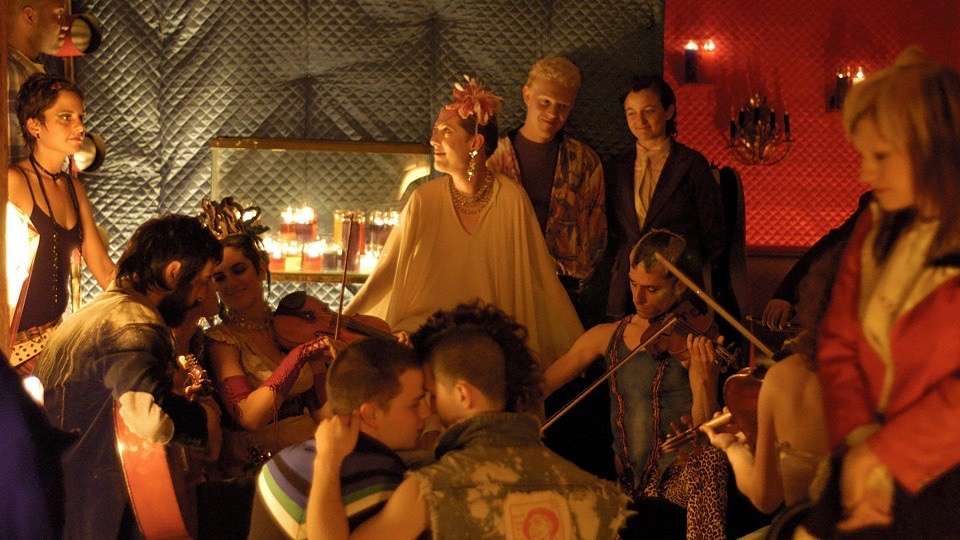
If you were a member of the queer community hanging around the NYC club-scene during the early 2000s, there’s a small chance you might have heard of DJ Dear Tic, and, if so, there’s a good chance that you might have heard about the parties they hosted – spirited gatherings that celebrated the coruscation of queer culture and fluidity of attraction and gender. Sexual curiosity was welcome. You could sing, you could dance, you could fuck. The name of this specific event was “Shortbus Sweaty Teenage Dance Party”, and it was just one of many of the like that were giving members of the LGBTQ+ the opportunity to explore themselves (and each other) in a communal space.
A few years later, in 2006, DJ Dear Tic, more commonly known as John Cameron Mitchell, would make a film called “Shortbus”, loosely inspired by those joyful New York carnivals of sexual discovery they helped pioneer, and a gem of queer cinema that has only improved in age over the span of 16 years (look no further than its impossibly accurate depiction of dating apps, three years before the unveiling of Grindr and 6 years before Tinder changed everything). An ode to the diverse group of misfits that would attend their gatherings, Mitchell saw fit to keep things as authentic as possible. Real sex, real people, with largely improvised dialogue. They put out a casting call: send a 10-minute tape describing a personal sexual experience. They received over 500 responses of which the cast of characters were plucked (alongside a horde of “sextras”, one of which included Mitchell, performing oral sex on a woman for the first time). Among the chosen were Sook Yin-Lee (having previously worked with Mitchell on Hedwig & The Angry Inch) – playing Sofia, a sex therapist who has never achieved orgasm –, Raphael Barker – Sofia’s loveably airheaded husband –, Adam Hardman and Paul dawson – a gay couple looking to dip their toes in polyamory –, and Lindsay Beamish – Severin, a dominatrix with dreams of being an artist. Over the course of a few nights, each character finds at Shortbus the key to self-acceptance and emotional breakthrough.
“They’re boring as hell” legendary trans cabaret singer Justin Bond, appearing in the film as mistress of Shortbus, mutters, as an arthouse film screens at the salon, “but I find the more boring they are, the more intelligent people think they are”. The validity of the statement itself is a debate for another time, though if so, Shortbus proves the opposite can be true. Much like the films of John Waters or Gregg Araki, other prominent voices of the Queer Cinema wave, Shortbus stays true to the kitsch and camp of queer culture while retaining a level of emotional intelligence that progresses beyond its years. There are moments here that would arguably be impenetrable to a straight cis filmmaker, who certainly might have golden intentions when handling queer stories but are ultimately limited to an outside-looking-in perception of a sub-culture deeply rooted in shared experiences; shared traumas. Mitchell, on the other hand, understands with full clarity the world these characters inhabit. Such second-nature familiarity with the reference points and intricacies of a culture allow for sequences like a night-long threesome between a gay couple and a younger man to strike the perfect balance of bitingly crude humour (“is that the first time someone sang the national anthem in your ass?”) and genuine tenderness. Or, a moment of intimacy between an openly gay 20-something and an elder who has spent most of his life closeted, both following a single thread from opposite ends, connecting somewhere in a space where their stories, though decades apart, are interwoven. A non-LGBTQ+ filmmaker risks fetishizing, or over-indulging in the gaze. Mitchell, time and time again, allows for moments of honesty and empowerment between their characters.
Some may see Shortbus’ deeply explicit and open approach to sexuality as a hair too far: pushing boundaries for the sake of shock value. For Mitchell, it seems more like the gateway to Eden – the natural state of things. No character is shamed for their desires, no matter how socially taboo they are perceived in the “real” world. Polyamory is embraced, kinks are normalized, gender is boundless. In this world, even a peeping tom is someone to empathise with (though not glorify – an important distinction), another character who has found their own, albeit problematic, way to connect. After all, ‘‘voyeurism is participation.”
The closing scene is utopian in its display of emotional and physical carnality as our ensemble, caught in the midst of the New York City blackout, shed their insecurities and give in to total sexual fluidity; everyone welcomed; everyone understood. All the while, Justin Bond begins to perform an anthem of community and liberation, soon joined by their fellow bohemians. Together, embodying in full circle the sentiment of chosen family, they sing:
“And as your last breath begins,
You find your demon’s your best friend,
And we all get it in the end,
We all get it in
The end…”
It’s glorious. Shortbus is glorious.






